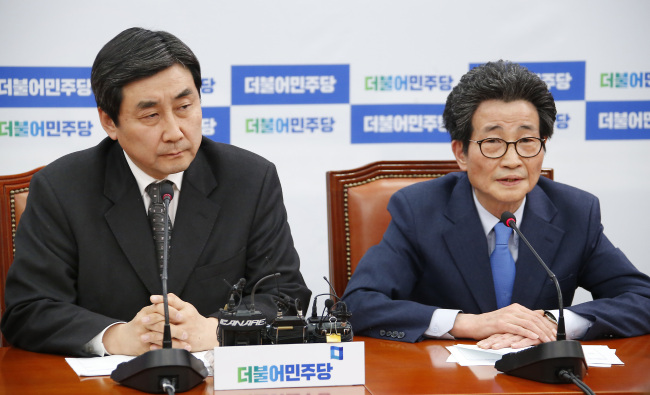Leaders of the rival parties are set to meet Saturday to speed up their negotiation on deadlocked bills, as they inched toward a compromise this week amid growing public frustration.
Floor leaders of the Saenuri Party and The Minjoo Party of Korea will meet along with Assembly speaker Rep. Chung Ui-hwa in a follow-up to their Thursday breakthrough to push forward some of the contentious bills.
The Minjoo Party has yielded their position and agreed to put to a vote the bills on easing regulations on big conglomerates. The Saenuri Party, in exchange, agreed to make adjustments on the North Korean human rights bill.
The parties have been locking horns over bills on labor reform, economic revitalization, counterterrorism and North Korea’s human rights.
While the parties have neared a compromise on most of them, they remain at odds over three sets of bills. They include bills on expanding the scope of dispatched employment, fostering service industries and preparing an antiterrorism system. The Minjoo Party has opposed the bills citing increased job instability, concerns of commercialization of medical services and excessive civilian surveillance power for the National Intelligence Service, respectively.
The parties are also required to renegotiate the election constituency map, which has been annulled since its expiration on Dec. 31.
 |
| The Minjoo Party whip Rep. Lee jong-kul(left) and Rep. Rhee Mok-hee brief the press after meeting with the ruling Saenuri Party`s leadership. Yonhap |
“We are doing our utmost to make visible progress no later than next week,” said the Minjoo Party whip Rep. Lee Jong-kul on Thursday. If the two parties manage an agreement, they would send the bills to the respective standing committees next week.
In terms of the business bills, the parties agreed to grant the conglomerates an extended period of one year, up from six months, to reorganize their circular shareholding ownership and streamline their businesses. The Minjoo Party had argued for chaebol to be excluded from the enforcement of the law.
Regarding the North Korean human rights bill, the lawmakers agreed to work on revising the contentious wording. A previous version had said that the government should “reconcile” efforts to improve the two Koreas’ relations with efforts to improve the North’s human right conditions.
The Minjoo Party had demanded the word “reconcile” be changed to a more binding term, such as “simultaneously pursue.” The Saenuri Party said they are not “95 percent” close to a compromise.
“Though the (agreed-upon) bills are not good enough, we take into account the people’s worries (about us failing to pass the bills),” said Minjoo Party Rep. Rhee Mok-hee, reflecting the party’s concern over the worsening public sentiment against the parliamentary stalemate. Rhee attended the negotiation with the Saenuri Party alongside Lee.
Business bodies such as the Korea Chambers of Commerce and Industry have led a campaign to gather 10 million signatures asking for the passage of the economic bills. President Park Geun-hye also joined the campaign and the nation’s top conglomerate Samsung Group has followed. Organizers said the number of participants who signed the petition online alone has already reached 147,700 as of Friday morning.
By Yeo Jun-suk (jasonyeo@heraldcorp.com)

